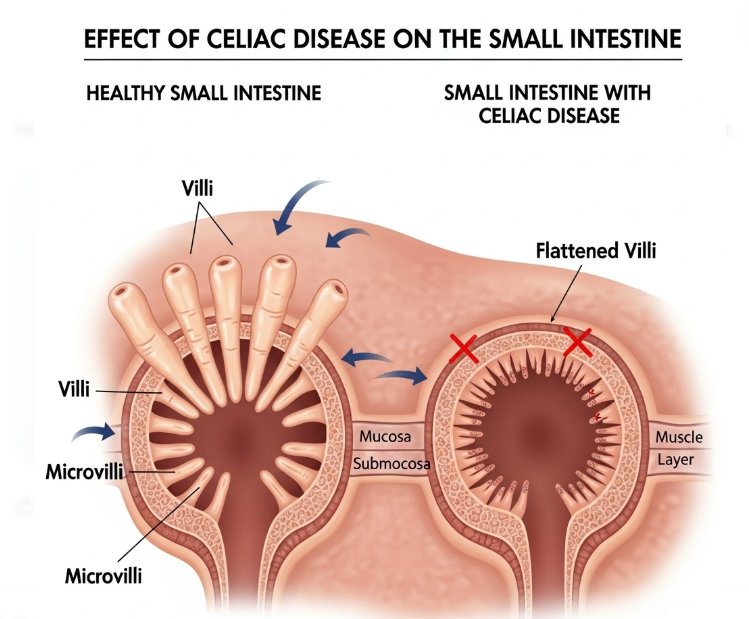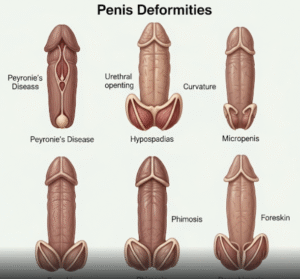Overview
Celiac disease is a chronic autoimmune disorder where the ingestion of gluten (a protein found in wheat, barley, and rye) triggers an immune response that damages the small intestine. This condition can lead to malabsorption of nutrients, digestive problems, and long-term complications if untreated. In Korea, although less common compared to Western countries, awareness of celiac disease is increasing, and specialized diagnostic and dietary management options are available.
What is Celiac Disease?
Celiac disease is caused by an abnormal immune reaction to gluten. When individuals with this condition eat gluten-containing foods, their immune system mistakenly attacks the lining of the small intestine, leading to villous atrophy (damage to the tiny projections in the intestine that absorb nutrients). This interferes with proper absorption of food and can cause both digestive and systemic symptoms.
Symptoms
- Chronic diarrhea or constipation
- Abdominal pain, bloating, and gas
- Weight loss despite adequate food intake
- Fatigue and weakness
- Anemia (iron, folate, or vitamin B12 deficiency)
- Osteoporosis or bone pain
- Skin rash (dermatitis herpetiformis)
- Infertility or menstrual irregularities
- Delayed growth in children
Causes
- Genetic predisposition (HLA-DQ2 and HLA-DQ8 genes)
- Consumption of gluten-containing foods
- Environmental triggers (infections, stress, surgery) may activate the condition in genetically predisposed individuals
Risk Factors
- Family history of celiac disease
- Type 1 diabetes
- Autoimmune thyroid disease
- Down syndrome and Turner syndrome
- Microscopic colitis or other autoimmune conditions
Complications
- Severe malnutrition
- Osteoporosis and fractures
- Infertility and miscarriage
- Lactose intolerance
- Increased risk of intestinal lymphoma and small bowel cancer
- Neurological problems (neuropathy, seizures, migraines)
Prevention
There is no known way to prevent celiac disease in genetically predisposed individuals. However, early diagnosis and strict lifelong avoidance of gluten can prevent complications and improve quality of life.
Treatment Options in Korea
In Korea, treatment mainly focuses on proper diagnosis, dietary management, and long-term monitoring to prevent complications.
Diagnosis
- Blood tests for celiac antibodies (tTG-IgA, EMA)
- Genetic testing for HLA-DQ2/DQ8
- Upper endoscopy with biopsy to confirm intestinal damage
Dietary Management
- Strict gluten-free diet (GFD): The only proven treatment for celiac disease. Patients must avoid wheat, barley, rye, and most processed foods containing gluten.
- Gluten-free alternatives are becoming more available in Korea, with imported products and locally made rice-based alternatives.
- Nutrition counseling is available in major Korean hospitals to ensure balanced diets.
Medical Support
- Supplements for iron, calcium, vitamin D, and B vitamins (if deficiencies exist)
- Monitoring for associated autoimmune diseases
- Regular follow-up to assess symptom relief and intestinal healing
Advanced Care in Korea
- Korean gastroenterologists are increasingly recognizing celiac disease, which was previously underdiagnosed due to low prevalence.
- Specialized dietary programs and support groups are growing in urban areas such as Seoul.
- Some hospitals offer integrated care with dietitians, endocrinologists, and gastroenterologists for patients with multiple autoimmune conditions.













